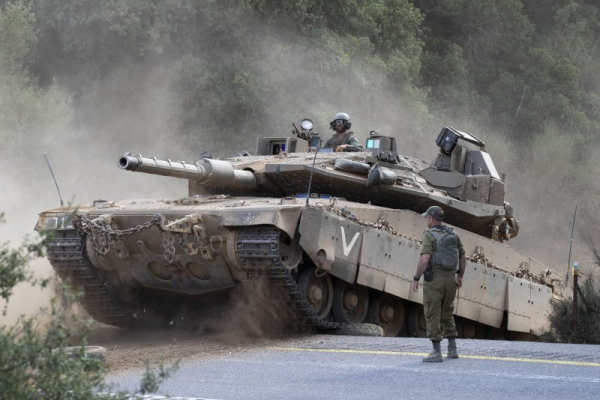Will Israel win the war, not just the battle, against Hezbollah?

An Israeli tank makes its way to the border of Lebanon during ground operations on Tuesday. Photo by Jim Hollander/UPI | License Photo
Israel’s recent strikes against Hezbollah seem a masterful operation so far. In attacks widely attributed to the country, thousands of pagers and walkie-talkies exploded Sept. 17 and 18 in Lebanon and Syria, resulting in deaths and disrupted communications among Hezbollah personnel. The Israeli Defense Forces (IDF) then killed many of Hezbollah’s top leaders, including 64-year-old Hassan Nasrallah, who had headed the organization since 1992 and was responsible for countless deaths, including of Americans, dating back to the bombing of the Marine Barracks in Beirut in 1983.
Air attacks also destroyed substantial numbers of Hezbollah rockets and weapons. Whether or not ground attacks will follow remains to be seen. Israel, however, cannot forget prior incursions into Lebanon in 1982 and 2006 that did not turn out well for the IDF. Advertisement Advertisement
The crucial question is whether Israel can turn this tactical success into a broader strategic and geopolitical victory. Too often, initial domination of the battlefield falls short of this goal. In Vietnam, it was argued that America never lost a battle. Yet, it lost the war.
The initial U.S. assaults in Afghanistan in 2001 and in Iraq in 2003 routed the enemy. But years later, Taliban still control Afghanistan and the United States will soon be withdrawing all its forces from Iraq. Now, Israel must confront the “What next?” question, regarding not only Hezbollah and Lebanon but also Hamas and Gaza.
Israel was previously losing the public relations battle over Hamas and Gaza for one major reason: Not all Palestinians are Hamas and vice versa. Yet, so many Palestinians have become casualties and victims of war that support has rallied against Israel on humanitarian grounds. Hezbollah is not Hamas and does not exist on Israeli territory.
Considering Hezbollah is a terrorist organization with perhaps the most powerful military capability of any non-governmental organization, the majority of the civilized world opposes it and its actions. Israel is not hindered by these humanitarian considerations. And apparently, using 2,000-pound MK 84 U.S.-manufactured bombs against underground Hezbollah bunkers had very little collateral damage. While similar precision may have applied to destroying Hamas underground tunnels, the impression of extensive collateral damage was created. Advertisement
What are Israel’s options? In terms of grand strategy, Israel could be pursuing the equivalent of a grand slam in bridge. By depriving Hezbollah of both leadership and military capacity, and with the threat of destroying more, Hezbollah could be forced to accept a negotiation in which it will withdraw substantially — perhaps north of the Litani River but far enough removed to avoid Israeli settlements being targeted with short range, anti-tank and other missiles not susceptible to interception. This would neutralize the so-called northern flank and give Israel time and space to consolidate its position.
More importantly, Gaza and Hamas could be resolved. Perhaps an Arab-led or other “peacemaking force” could be brought to bear to control Gaza and limit the role and influence of Hamas. Here, imagination is vital to envision options to end the violence, now that Hezbollah has been defanged and partially neutralized. But new opportunities are possible.
Of course, this may be a bridge too far. Other players may not be interested in engaging in peacekeeping and the expense of rebuilding Gaza. Hezbollah may not be as badly hurt as it appears. Similarly, Hamas may not have been sufficiently reduced to prevent its recurrence and rejuvenation. Advertisement
Domestically in Israel, right wing extremists may demand further military action to disarm Hezbollah and Hamas that would escalate the role of the IDF, turning this into an endless war. The argument would be to complete the job. Yet, completely destroying both terrorist organizations would require the destruction of much of Gaza and southern Lebanon.
Israeli Prime Minister Benjamin Netanyahu’s popularity has risen dramatically following Israel’s recent actions toward Hezbollah. Netanyahu will try to use that popularity to cement his prime ministership after the criticism he took over Hamas. How that would affect a grand strategy is unclear. One would have thought a major settlement that includes all these parties would be to Netanyahu’s advantage.
Whether the influence of the United States, United Nations and other actors will have any impact remains to be seen. But the United States should consider how a grand bargain might be put in place to achieve peace or reduce violence and retrieve those prisoners Hamas may still be holding. The opportunities are real.
Will Israel exploit its recent tactical victory and convert it to strategic advantage? To do so, it must answer the “What next?” question.
Harlan Ullman is UPI’s Arnaud de Borchgrave Distinguished Columnist, a senior advisor at Washington’s Atlantic Council, the prime author of “shock and awe” and author of “The Fifth Horseman and the New MAD: How Massive Attacks of Disruption Became the Looming Existential Danger to a Divided Nation and the World at Large.” Follow him @harlankullman. The views and opinions expressed in this commentary are solely those of the author. Advertisement